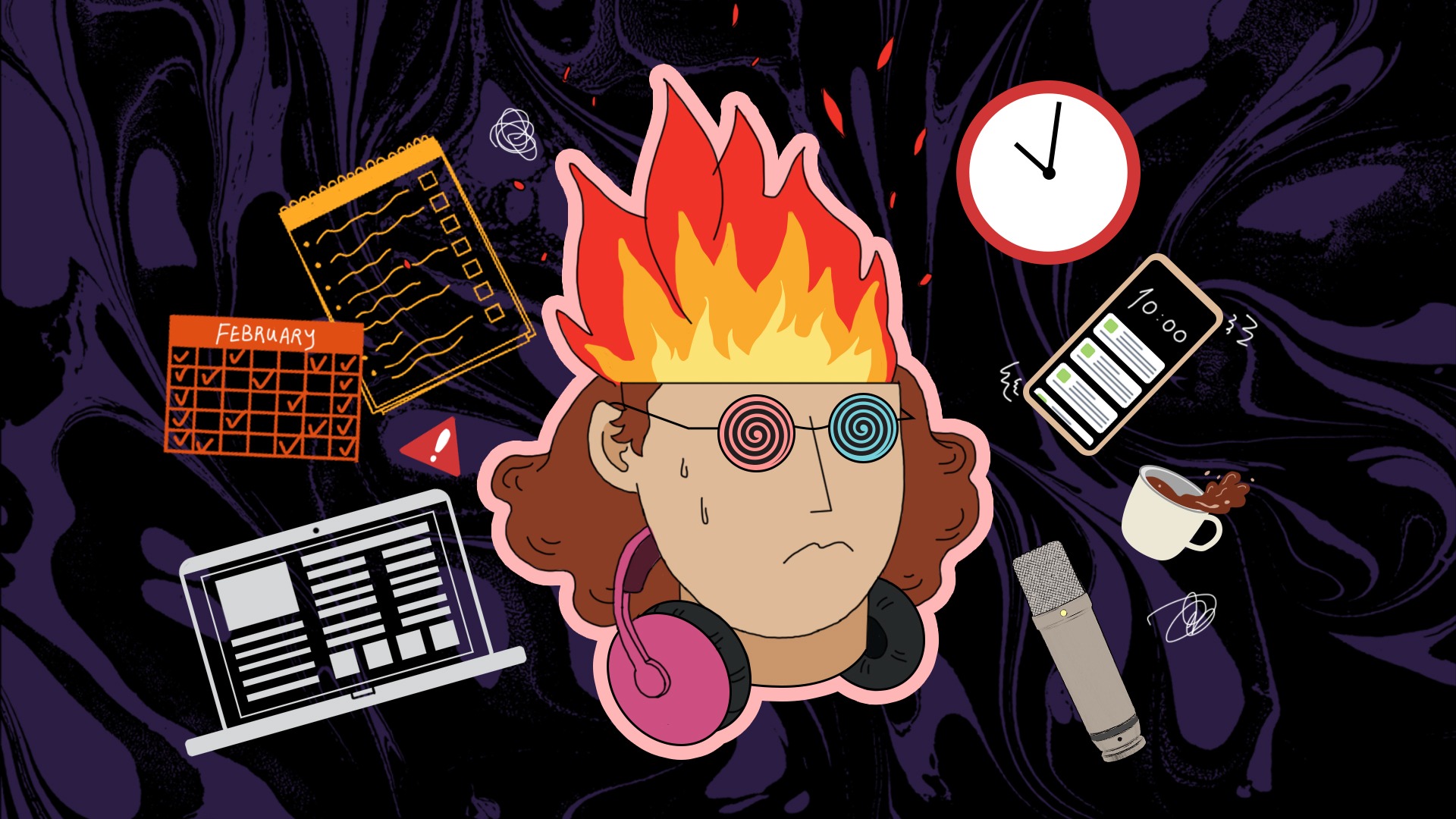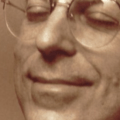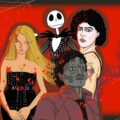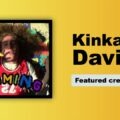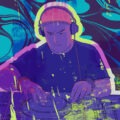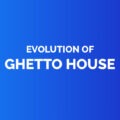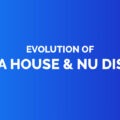Entering a new year in the music industry is an exciting time filled with new projects and possibilities. It can feel like a fresh start, bringing artists and industry professionals a restored sense of inspiration and motivation. There are festivals to apply for, albums to finish, and a whole year of creative and career opportunities ahead.
But what happens when all your peers seem to be gaining momentum, and you feel like you’re falling behind? The pressure to keep up can be crushing for musicians and their managers alike. With everyone posting their highlight reel online, it’s easy to compare ourselves and focus on our shortcomings rather than our accomplishments.
RAC sat down with five members of the Canadian music industry, from musicians and producers to venue managers and label founders, to hear about their experiences with burnout and the ways they’ve learned to deal with it before getting overwhelmed.
Jonny Tobin, Grammy-nominated keyboardist and producer
RAC: What is your experience with burnout as an artist?
Jonny: I don’t think I’ve hit a full burnout, but I’m almost constantly teetering on the edge of it. I do music full time, so as a freelancer, it’s a lot of saying yes to everything. When the calendar is empty, you feel like you need to fill it up, but then I fill it beyond the brim and feel overcommitted. Sometimes it’s 10 days on. I was just on tour, had one day off, then went right into 7-hour rehearsal days. Thankfully I’m off today, but if I wasn’t, I’d be at a burnout starting point. When I’m overloading and stacking things, I feel a powerlessness over my own schedule.
Setting boundaries clearly is necessary. I keep all my gigs and commitments in a calendar, and then I pencil in my days off like a booking. You have to advocate for yourself, take your own power, and be in command of your schedule. It can be very difficult to say no, but we need to listen to our hearts and to our mental health. I think one of the keys to making great art is the down time, and having that time to not create.
RAC: Do you feel more pressure or inspiration at the start of the year, especially seeing all the projects your peers are working on?
Jonny: I feel like it’s easy sometimes to compare. We spend a long time looking at what everyone is doing online. You see someone’s page and think, “This person is doing so much… I need to do more”. People often think that I’m doing a lot because I post almost daily, but I don’t really post when I’m having a rest day. Normalizing depicting days off on social media might give people less FOMO. I’m actually able to do more when I give myself time off. It’s important to cultivate those times to play. Sometimes when you have too much rigidity, it takes away from the fun.
RAC: How have you learned to avoid burnout or deal with feeling overwhelmed? Any tips?
Jonny: Scheduling days off ahead of time is great. When you’re in an emergency situation where you’re about to hit a burnout point, try to take things one day at a time. If you’re in a really busy period, take even just one hour in the day to do something for yourself – maybe go for a walk or a sauna. Take a break from social media and technology. Say, “I’m not going to be on my phone for 24 hours”, and then really put your phone away.
Check out Jonny Tobin’s Website | Spotify | iTunes
Sarah Armiento, artist manager and head of Hot Tramp Records
RAC: What is your experience with burnout while running your own label and artist management agency?
Sarah: In this industry, you feel the need to wear multiple hats just to make a living wage, so my main experience is feeling like I always have to take on more – I can never just do one job. For example, on top of Hot Tramp label and management, I also need to do freelance grant writing or contract my services elsewhere, all the while concentrating my efforts on the company I’m trying to grow. I guess burnout is feeling like you’re constantly spreading yourself too thin, and that it’s preventing you from achieving your goals. That cycle can get discouraging.
RAC: Do you feel more pressure or inspiration at the start of the year, especially seeing all the projects your peers are working on?
Sarah: The music industry gives you a month to get ahead and plan, so I feel more inspired at the start of the year. There’s an optimism to it. It’s a new spring touring season, and it feels like a fresh start. I would say I feel more antsy mid-year or in the fall.
I’m definitely my biggest critic. When you’re running your own business, there’s always something more you can be doing or a next step you want to reach. When you see projects on social media progressing faster than yours, it can be hard. It’s important to keep that blocked out because comparing is a losing game. There’s no exact formula for how to make things work and everyone’s timeline is different. That’s something I’ve had to learn over the years.
RAC: How have you learned to avoid burnout or deal with feeling overwhelmed? Any tips?
Sarah: I’m trying to steer away from those quantifiable markers of success and continue to focus on projects I feel inspired to do. I’m focusing less on if we got X Spotify playlist or however many followers, because I feel like even once you hit those markers you think you want, there’s always going to be the next ones that you didn’t get. Make sure you work on projects you truly believe in and that you feel good about putting out in the world. See that as a success in itself, and steer away from putting a numerical badge on what it means to succeed.
Check out Sarah Armiento’s Website | Instagram
Janette King, vocalist, multi-instrumentalist and DJ
RAC: What is your experience with burnout as an artist?
Janette: For me, I usually go through periods of hyper creativity, and then kind of nothing. I don’t know if that’s necessarily because of burnout, but I do feel a lot of pressure from social media and my own internal compass of what I believe I should be accomplishing. That can hinder my creativity and cause me to hyperfocus on the things I’m not doing, which is a stressor for sure.
In general, as someone who doesn’t have a massive team, there are so many things to focus on. These days, you have to promote yourself, but you also have to stay on top of social media trends and various new ways of getting your music out there like TikTok. You have to do so much just to get anywhere and it takes away from the creativity of writing music. It’s hard work and you get tired… It’s disheartening sometimes.
RAC: Do you feel more pressure or inspiration at the start of the year, especially seeing all the projects your peers are working on?
Janette: The start of the year is always a positive time for me. I like recentering and refocusing; that concept of starting fresh. I do get inspiration from the people around me, but it’s usually an internal thing, where I feel re-inspired by my own convictions.
It can be hard to carry that inspiration throughout the year. I feel like I eventually hit a wall around festival time, especially when I don’t get into a lot of big festivals – it hurts my soul! You start off a year with all these hopes around the work you’re doing, and when it doesn’t come to fruition you kind of ask yourself what you’re doing this for. But everything comes in cycles, and I think it’s important to take the good with the bad.
RAC: How have you learned to avoid burnout or deal with feeling overwhelmed? Any tips?
Janette: I try to think about the things I’ve accomplished: my band, how I have the most supportive manager, how lots of people have messaged me saying my music got them through a dark period – things like that. When I calm and center myself and everything goes quiet, I ask myself what I want, and the answer is always to write music and sing. I’ve always felt like that’s my calling. We just have to persevere.
Taking a break from music actually helps me feel like I can refocus on music. Exercising, travelling, and having new experiences all help me feel inspired.
Check out Janette King’s Instagram | Spotify
Jason Bissessar, head of marketing and editorial partnerships
RAC: What is your experience with burnout working in marketing in the music industry?
Jason: When the year starts, I do feel refreshed, but there’s a full year ahead and Montreal’s first months are cold. I usually get rest around the holidays, but when you’re starting a new year with the winter darkness, snow, and working from home, you know that the first few months are not going to be the best for energy and motivation. That being said, I make it work, and I don’t think I’ve ever felt burned out.
RAC: Do you feel more pressure or inspiration at the start of the year, especially seeing all the projects your peers are working on?
Jason: What inspires me can come at any time of year. It depends on the projects I’m working on and the passion people have. That really energizes and motivates me – it’s super fun when something new is coming up in January or February. I’m inspired by the artists’ teams, their managers, the quality of music, and the plans that lie ahead for them. I’m working on the streaming side, marketing and strategies, so it feels fulfilling to help people reach their goals.
I never really feel pressure when I know I’ve done everything I can. You have action plans in place, you put your best foot forward, and if it fails, then you try something else. I’ll have my experience behind me, and obviously I’m not happy about it, but there’s always a next time, a next song, a next album.
RAC: How have you learned to avoid or deal with burnout? Any tips?
Jason: It’s very much about experience. Once you’ve worked in your field long enough, you’ve had both successes and failures, big and small. It’s important to have lived it – it might even be more credible – since it allows you to explain and share with the people you’re working with what you’ve seen happen in the past and how to turn things around in a positive way.
Austin Wrinch, co-founder and manager of the Diving Bell Social Club
RAC: What is your experience with burnout running a busy multimedia performance venue?
Austin: I felt the most burned out during the deepest lockdown periods, when I didn’t have the ability to do or plan things. I find for me, a big part of dealing with burnout is being able to sit down and put things in the calendar. During the pandemic, you couldn’t really plan anything a week ahead without knowing if the world was going to change. My experience of burnout was having the energy in me but not being able to get it out.
There are definitely also times when I just have to consciously tune out and put my phone away, usually just for an afternoon. But personally, I like having a to-do list – it actually gives me power and helps me feel more in control.
RAC: Do you feel more pressure or inspiration at the start of the year, especially seeing all the projects your peers are working on?
Austin: I feel like I’m still very much aware of how amazing it is to have a room full of people dancing and partying and not living in fear. It gives me energy when there’s a big show because, until recently, those things felt so impossible. The experience of living in Quebec with the curfews specifically put into perspective how important it is to have people listening to music in a room together, and how ultimately fragile that is. It makes me not want to waste any more time.
I feel like the pressure comes more from how we at the Diving Bell are always trying to do as many different kinds of things as possible, whether it’s music, drag, or comedy all on the calendar simultaneously. The goal is to always keep it diverse. The space is more sought after than it was before and the pressure is about trying to maintain the original goal.
RAC: How have you learned to avoid or deal with burnout? Any tips?
Austin: Allow yourself time to unplug. I’m not a huge social media person, so unless it’s for work, I actively try to not look at screens when I don’t have to. I meditate and try to eat well and drink lots of water. Getting into subtle healthy rhythms really does make a difference around burnout. I’ve realized that when you’re getting to that point in your brain where it feels like the tires are spinning, even if you have tons of stuff to do and people waiting on you, you’ll probably do better if you just take the day off. It’s easy to get stressed or overwhelmed, so surround yourself with people who can remind you that life is actually pretty simple.
It’s impressive how resilient music and art communities are, even when faced with so many challenges and lack of financial stability. It feels gratifying to be doing something that clearly there is a need for. A lot of energy goes into it, but the energy that you get back, you can’t really get anywhere else.
Check out the Diving Bell Social Club’s Website | Instagram
– Final Notes –
Whether it’s for a day, or even just an hour, it’s important for all music industry players to take a break. Ways to disconnect can be as simple as putting your phone away, getting off social media, exercising, or taking time to yourself to breathe and refocus on your goals in chaotic times. Prioritizing mental health is especially important in a business that can make us feel like we aren’t really “allowed” to take days off.
Ultimately, our performance, output, and energy will always be stronger if we recharge those creative batteries before they run out. In 2023, let’s encourage each other to listen to our bodies and minds, and rest when we need to, so that we can have our most productive – and fulfilling – year yet.
Written by Maryse Bernard
Illustration by Yihong Guo
